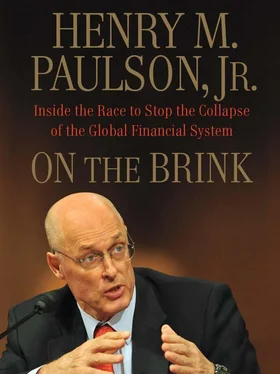When the lunch was over, Wendy and I walked onto the White House grounds by the entrance to the Treasury. It was a gorgeous day, the magnolias and cherry blossoms in full bloom set dramatically against a crisp blue sky.
I felt awful.
I don’t hide my emotions well, and Wendy could see I was distressed. She said: “Pea”—which is what she likes to call me—“I hope you didn’t turn this down because of me. You know if it was really important to you, I would have agreed.”
At the time, she thought that was a throwaway line.
“No,” I said, “I didn’t.”
Shortly after, I went down to the Yucatán for a Nature Conservancy meeting, and I was in agony wondering whether I’d made a mistake. Almost everyone I’d consulted had advised against it. They would say: “You’re the head of Goldman Sachs. You’re the man; why go to Washington? The president has just two and a half years left. Look how unpopular he is. The Republicans are about to lose Congress. What can you possibly get done?”
And yet part of me knew I owed much to my country, and it troubled me to say no to the president when he was asking for help. My good friend John Bryan reminded me that “there are no dress rehearsals in life. Do you really want to be 75 and telling people ‘I could have been Treasury secretary’?”
I called Rogers and said, “John, I can’t believe I’ve done this.”
He said, “Well, you may get another chance. They may come back.”
And they did. I was in Germany on business in May, when Josh called again, and I agreed to meet him in D.C. on my way out to the West Coast for a Microsoft conference. We talked in a private suite at the Willard Hotel about what could be accomplished in the remaining years of the administration. We talked about what it was like to work with the president and about pressing policy matters like the need for entitlement reforms, as well as other areas where he thought I might be helpful, such as with Iran and cracking down on terror financing.
I turned to a number of people for advice. Jim Baker, the former secretary of Treasury and State, who had recommended me to the president and urged me to accept the position, said that I should ask to be the primary adviser and spokesman for all domestic and international economic issues. “That,” as he put it, “really covers everything.”
I was still struggling to decide. My epiphany came while I was flying out to the Microsoft meeting. As I thought through my decision, I recognized that it was simply fear that was causing me such anxiety. Fear of failure, fear of the unknown: the uncertainty of working with a group of people I had never worked with before and managing people I had never managed before.
Once I understood this, I pushed back hard against the fear. I wasn’t going to give in to that. I prayed for the humility to do something not out of a sense of ego, but out of the fundamental understanding that one’s job in life is to express the good that comes from God. I always believed you should run toward problems and challenges; it was what I told the kids in camp when I was a counselor, and I now told myself that again. Fear of failure is ultimately selfish; it reflects a preoccupation with self and overlooks the fact that one’s strength and abilities come from the divine Mind.
I arranged to go back to Washington to see Josh again. As we sat in front of the fireplace in his office, beneath a portrait of Abraham Lincoln, I laid out my “asks.” In addition to being the administration’s primary economic adviser and spokesman, I wanted to be able to replace political appointees and bring in my own team, and to have regular access to the president, on a par with the secretaries of Defense and State. I asked to chair the economic policy lunch held at the White House. Josh rang up Al Hubbard, the National Economic Council (NEC) director, at his home in Indianapolis to be sure he was all right with this, and he was.
After Josh and I worked out these details, I went up to see the president in the residence. I found George Bush to be personable, direct, and very engaged. He was relaxed, having come in from a bike ride that morning, and had his feet up. We talked about a number of issues: how important it would be to address entitlements, and that perhaps having the Treasury secretary as opposed to the president lead this effort might help win support from both sides of the aisle. We talked about using financial sanctions to make a difference with Iran and North Korea. At the end of the hour-long meeting, I told him that I planned to accept.
From there, things went into overdrive. An announcement had to be made before the news leaked. I flew out to Barrington for the weekend to spend some time with Wendy, who was in despair over the impending loss of our privacy as we were fed into the Washington meat grinder, and to tell Mom the news. Then I returned to New York and called Lloyd Blankfein, summoning him back from a weekend with his family to discuss the developments. I asked Lindsay Valdeon, my trusted assistant at Goldman Sachs, to make the move to Washington with me, and she agreed.
I then called the board members and all 17 executives on the management committee to tell them, and asked Lloyd and John Rogers to fly with me to Washington for the ceremony.
Afterward, we flew out to Chicago for a previously scheduled partners’ meeting. I woke up the next morning, and I was on the front page of every newspaper. It took my breath away. Even though the coverage was positive, it was unnerving.
The Senate voted to confirm me before the Fourth of July recess. There was only one hurdle remaining—my mother. I was concerned about what she might say when she met the president. She promised me that she would be on her best behavior.
I was sworn in on July 10, 2006. The ceremony took place in the Treasury Building’s Cash Room, an extraordinary space that was designed in the 1860s to look like an Italian palazzo. It has marble floors and marble-clad walls that soar to an ornate gold-edged ceiling from which massive bronze chandeliers hang. Until it was closed for security reasons in the 1970s, the room had been open to the public: government checks could be cashed there and Treasury bonds purchased. My oath of office was administered by Supreme Court Chief Justice John Roberts with President Bush—and my mother—in attendance.
My mother suffered when Hillary Clinton lost in the 2008 Democratic primaries to Barack Obama; she wants to live to see a woman become president and the Cubs win the World Series. And she voted for Obama. Given the chance again, she probably still would not have voted for George W. Bush in 2000 or 2004. But after watching the way he worked with me, and having heard me report back to her about one issue after another, I can tell you this: she looks at the president a lot differently today than she did when I first went to Washington. So do Wendy, Merritt, and Amanda.
Thursday, August 17, 2006
In August 2006, President Bush gathered his economic team at Camp David. The presidential retreat is a beautiful wooded spot with rustic lodges and mulched paths one and a half hours by car from Washington, in western Maryland’s Catoctin Mountain Park. It had been five weeks since I had been sworn in as secretary of the Treasury, and I was still feeling my way as an outsider in a close-knit administration.
The economic outlook was strong. Stocks were trading just below their near-record highs of May. The dollar had shown some weakness, particularly against the euro, but overall the U.S. economy was humming—the gross domestic product had risen by nearly 5 percent in the first quarter and by just below 3 percent in the second quarter.
Nonetheless I felt uneasy. On the macro front, the U.S. was conducting two wars, the expenses from Hurricanes Katrina, Rita, and Wilma were mounting, and our entitlement spending kept growing even as the budget deficits shrank. This odd situation was ultimately the result of global financial imbalances that had made policy makers nervous for years. To support unprecedented consumer spending and to make up for its low savings rate, the U.S. was borrowing too much from abroad, while export-driven countries—notably China, other Asian nations, and the oil producers—were shipping capital to us and inadvertently fueling our spendthrift ways. Their recycled dollars enriched Wall Street and inflated tax receipts in the short run but undermined long-term stability and, among other things, exacerbated income inequality in America. How long could this situation last?
Читать дальше












